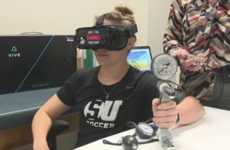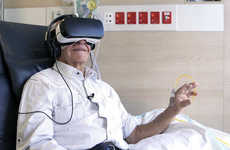



Virtual reality's use in physical therapy is on the rise
Trend - VR technology is now being adopted into physical therapy, with companies and health care providers creating personalized programs that those in need can take part in at home. This form of virtual therapy aims to enhance mobility and relieve pain like its in-person program counterparts do, with the added benefit of accessibility and the increased likelihood of commitment.
Insight - When it comes to any form of therapy, consistency is key for consumers' to achieve success in their established goals. However, consumers who face accessibility issues that relate to finances or remote geographic locations are less likely to maintain the results required for them to remain healthy in the long-term. Thus, consumers are seeking out routine-maintaining technologies that are effective despite barriers to the traditional healthcare system.
Insight - When it comes to any form of therapy, consistency is key for consumers' to achieve success in their established goals. However, consumers who face accessibility issues that relate to finances or remote geographic locations are less likely to maintain the results required for them to remain healthy in the long-term. Thus, consumers are seeking out routine-maintaining technologies that are effective despite barriers to the traditional healthcare system.
Workshop Question - Where do you see virtual reality impacting your brand or industry?
Trend Themes
1. Virtual Reality Therapy - Virtual reality technology is being adopted by physical therapy professionals and companies to make rehabilitation more accessible and engaging
2. Gamification of Therapy Exercises - Companies like Verapy are incorporating gamification into occupational and physical therapy exercises through virtual reality technology, keeping patients motivated and engaged
3. Innovative Healthcare Startups - Startups like Kindbody aim to revolutionize traditional healthcare experiences such as fertility treatments, making personalized plans and virtual therapy accessible to patients
Industry Implications
1. Healthcare - The healthcare industry can leverage virtual reality technology to create innovative and accessible therapy programs for patients
2. Gaming - The gaming industry can explore opportunities to provide virtual reality games specifically designed for therapeutic purposes, expanding beyond entertainment
3. Wellness - The wellness industry can incorporate new technologies like virtual reality and gamification to create engaging and personalized experiences for consumers seeking therapeutic solutions













































